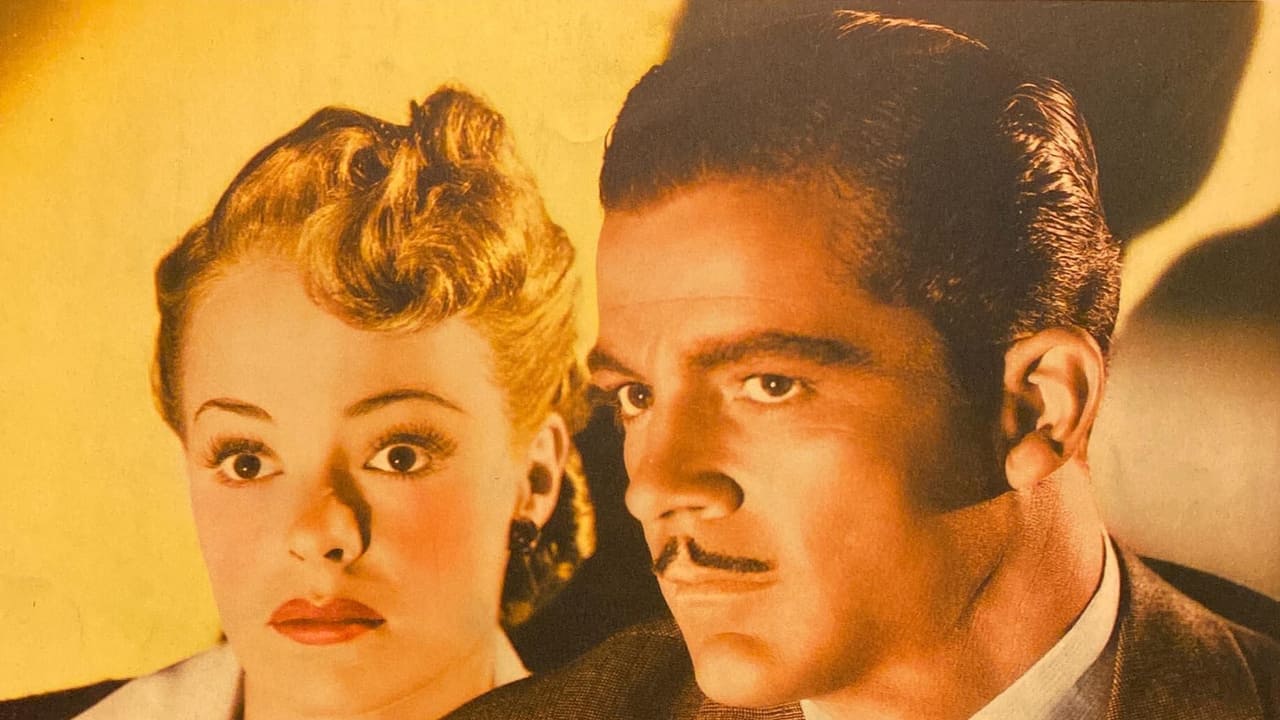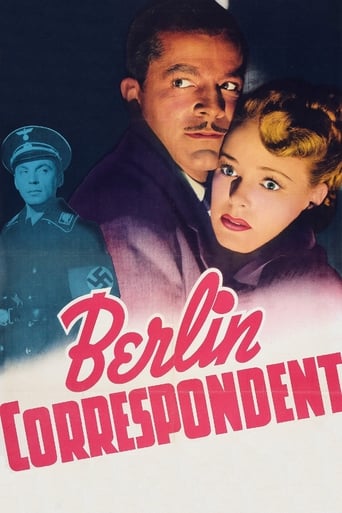



It isn't all that great, actually. Really cheesy and very predicable of how certain scenes are gonna turn play out. However, I guess that's the charm of it all, because I would consider this one of my guilty pleasures.
View MoreThis is a small, humorous movie in some ways, but it has a huge heart. What a nice experience.
View MoreJust intense enough to provide a much-needed diversion, just lightweight enough to make you forget about it soon after it’s over. It’s not exactly “good,” per se, but it does what it sets out to do in terms of putting us on edge, which makes it … successful?
View MoreThe movie's not perfect, but it sticks the landing of its message. It was engaging - thrilling at times - and I personally thought it was a great time.
View MoreExecutive producer: Dore Schary. Copyright 6 May 1948 by RKO Radio Pictures, Inc. New York opening at the Victoria: 20 May 1948. U.S. release: May 1948. U.K. release: 18 October 1948. Australian release: 17 February 1949. 7,893 feet. 87 minutes.SYNOPSIS: Underground Nazis are hunted in post-war Germany.COMMENT: Actually photographed in Frankfurt and Berlin (by authorization of the British, Soviet and U.S. authorities), this taut, exciting, suspenseful thriller has a director who knows how to get the atmospheric best out of his stark and striking natural locations. Moody lighting is a great help too - and so is the ironic background commentary, rarely obtrusive and often neatly counterpointing what occurs on the screen. Tourneur's direction is highly inventive - the characters introduced as the camera tracks along the outside of the train's compartments, the clown toppling into the camera - and he is well served by his cast: Merle Oberon has little to do, though she is a graceful actress and it is pleasing that she does not get involved in any romantic cliches; Robert Ryan is ideally cast, bringing some depth to a part that could easily have been turned into either a foolish caricature or just a walking mouthpiece for philosophic ideals; Charles Korvin has a difficult role, but he and the director have chosen the easy way out by keeping him in the background; Paul Lukas plays with his usual easy authority and assurance; Robert Coote essays the stage Englishman, but with some restraint; former Hollywood director Reinhold Schunzel plays a traitorous friend with convincing weariness and passion; Roman Toporow is a little green as the Russian lieutenant, but this suits the part; Peter Von Zerneck plays the clown with style; Otto Waldis has a small part but he turns it into the film's most memorable portrayal, spitting out revolutionary lines with the spellbinding skill of a satanic demagogue. Even the minor roles are enacted with unobtrusive artistry - Michael Harvey as a phoney sergeant, Charles McGraw as the interrogating officer. Siodmak evidently wrote his story to utilize the actual German locations to the utmost, with every twist in the plot bringing in a new background, as well as piling suspense on suspense. Tourneur handles the action episodes with as much skill and unobtrusive yet exciting authority as he brings to the dialogue and documentary scenes. Other credits are likewise skilled-the music score is unpretentiously effective and the art direction is quite striking. Production values are A-1. OTHER VIEWS: Exciting direction and excellent photography in a neat thriller that tries a little too hard to stress its political message.
View MoreMartin Kosleck est known or recognized by movie fans as the red-herring windmill resident replacement in Alfred Hitchcock's classic, FOREIGN CORRESPONDENT, and unlike that memorable, sparse yet important cameo, he's pretty much the entire vehicle for this particular CORRESPONDENT made two years later, only now we're on his home turf during, not before, The Second World War: BERLIN, Germany against American Dana Andrews, with a pencil thin mustache usually given to Silent Movie villains, playing the most intrepid role by mere introduction... A New York broadcast telling America the names of all overseas Correspondents, ranging from men working in England to Holland, which sound like soft jobs as opposed to where Dana's Bill Roberts works, reading what seems like German-written propaganda about their side of things, but with secret coded adjectives, he gets through to his newspaper back home, and, despite acting permanently teflon, like some kind of one-dimensional comic book hero (not one of Andrews' best roles), with the severity of his job, the attitude fits: especially in a feel-good wartime programmer.She doesn't know anything, and stuck in a cold, heartless romance with intense Nazi Captain von Rau, played by Martin Kosleck, she's actually in the most danger since he's the scariest character. But like all good actors, there's a vulnerable side that sheds wan light through an otherwise steely countenance. With his severe looks, though, it's not easy to pull off being all that friendly.Kosleck, who'd play sinister Germans throughout his career, owns the picture for more than his narrowed-eyes wielding an intense, soulless reflection of The Furor's agenda. While Andrews' story revs up, taking verbal shots at The Third Reich in an obvious attempt to make Hitler seem like the type of clown Charlie Chaplin portrayed in THE GREAT DICTATOR, the sole heavy, by standing firm and playing the role with unbridled fervor while still remaining alert and controlled, is the centerpiece - even as Andrews eventually becomes a more physical hero, and gets deeper into trouble - from a last minute race-against-time attempt to save his girl involving a psycho ward and then his own hopeful prison escape - our edgy German spotlight is the reason that anyone fears anything at all: In short, Kosleck has the job of embodying the entire Nazi Party.
View MoreRidiculous film here. Dana Andrews was miscast in 1945's "State Fair," and is a victim of unbelievably bad writing and some poor taste exhibited in this very stupid film. Thank the Lord for Andrews that 1946's "The Best Years of Our Lives" allowed him to display his great acting talents.This film is ludicrous at best. The escape scene of the heroine's father becomes comedy at its worst. Sig Ruman and Andrews are literally caught with their pants down. Ruman's remark that Hitler needs a psychiatrist and that by the Nazis killing all the insane people, will leave Germany as a sane country is insensitive to the say the least. Hitler needed more than a psychiatrist. It is called a bullet between the eyes. Am sure we would have loads of volunteers to carry this out.The movie also brings out that hell hath no fury like a woman scorned-even a dedicated Nazi woman.Notice that the Nazi woman sent to spy on reporter Andrews is as Nazi as they come, but how she changes when it's determined that her father is part of the anti-Nazi spy ring. Unrealistic. Obedient Nazis were taught to turn in their own parents if necessary.
View MoreBERLIN CORRESPONDENT was one of many propaganda films that entertained World War II audiences in 1942. When it played the local theater houses in the New York area during the age of double features, BAMBI was on the top half of the bill with the DANA ANDREWS film second on the bill.It's got a really improbable storyline but if you can accept the fact that this is "just a movie" and made for propaganda escapist fare in the early '40s, it's well worth watching.Dana Andrews is excellent as an American reporter who risks his life so that his sweetheart and her professor father can escape the Nazis. By the time the story gets to the concentration camp scenes near the end, it has compiled a number of improbable twists and turns. Nevertheless, it's briskly paced, well acted and photographed in crisp B&W style that results in good entertainment. The story moves to a fast-moving climax when Dana's planned escape goes amok.Martin Kosleck makes the most of his Nazi role, the kind he played often in these wartime dramas, and Virginia Gilmore is pleasantly appealing in the leading femme role. Mona Maris seemed to specialize in playing bad girl spies in these kind of stories.Taut, tense and exciting, flawed only by some improbabilities in the script.
View More